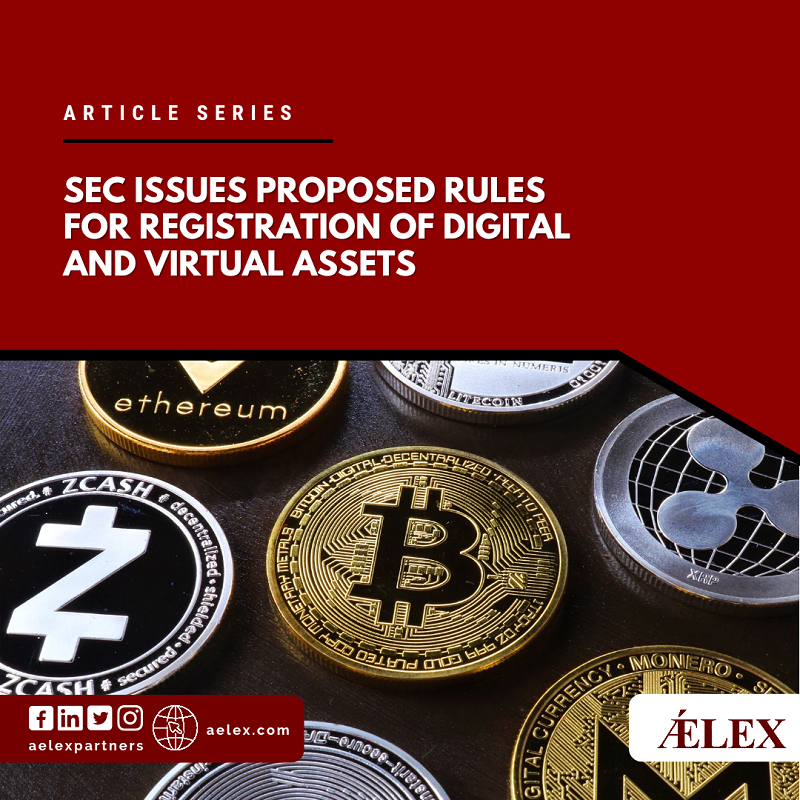Introduction
In its drive to regulate digital/virtual assets, the Securities and Exchange Commission (SEC) has released Proposed Rules for Registration of Virtual Asset Service Providers (VASPs) and Proposed Rules on Issuance, Offering Platforms and Custody of Digital Assets. This is an expected move following SEC’s Director-General’s announcement in September 2021 that a department had been set up to study the crypto market and aid in the creation of informed regulatory policies for the market.[1]
Below is a summary of some of the notable provisions of the Proposed Rules (the Rules).
Proposed Rules for Registration of Virtual Asset Service Providers
- The Rules apply to all platforms that facilitate trading, exchange and transfer of virtual assets whose activities involve any aspect of Blockchain-related virtual/digital asset services; all issuers and sponsors of virtual/digital assets, including foreign and non-residential issuers and sponsors; and any operator that actively targets Nigerian investors.
- The Rules offer a definition of key terms such as Virtual Assets, Virtual Asset Service Providers (VASP) and Digital Asset Exchanges (DAX). Furthermore, the Rules provide for registration requirements on VASPs and DAX. The Rules also impose strict obligations on the VASPs and DAX, including mandatory compliance with all SEC rules and regulations, taking active measures to protect consumers, complying with all extant AML/CFT measures, transparency, extensive reporting requirements, maintaining accurate records and providing SEC access to its registers upon request.
- For the DAX, the Rules further stipulate that they must have a minimum paid up capital of N500,000,000 (Five Hundred Million Naira) and a current Fidelity Insurance Bond covering at least 25% of the stipulated minimum paid up capital.
It is noteworthy that the Rules provide that SEC shall charge fees on transactions carried out in virtual/digital assets traded on a DAX at a rate or percentage to be determined by SEC from time to time.
Rules on Issuance, Offering Platform and Custody of Digital Assets
- The Rules apply to all issuers seeking to raise capital through digital asset offerings.
- The Rules require all promoters, entities or businesses proposing to conduct initial digital asset offerings within Nigeria or targeting Nigerians to submit an initial assessment filing (including a whitepaper) which the SEC shall review within 30 days upon submission.
Upon review and approval, an application for registration can be made to the SEC with details of the tokens such as name and ticker of the token, price per token, number of tokens to be sold and amount of tokens to be registered.
- Documents and policies such as Know-Your-Customer (KYC) procedures, disaster recovery plans, security protocols and a solicitor’s opinion confirming that all applicable permits and licences have been obtained are to be submitted to SEC. It is noteworthy that the Rules exempt securities structured to be offered through crowdfunding portals or intermediaries from registration.
- The Rules provide that the funds to be raised by an issuer shall not exceed twenty times the issuer’s shareholders’ funds within any continuous 12-month period, subject to a N20,000,000,000 (twenty billion naira) ceiling. Similarly, the Rules provide for investment limits for retail investors of N5,000,000 (five million naira) per issuer with a total not exceeding N20,000,000 (twenty million naira) within a 12-month period.
- The Rules also provide for a moratorium on equity interest requiring that the directors and senior management of the issuer must, in aggregate, own at least 50% equity holding in the issuer on the date of issuance of the digital assets. Furthermore, post-issuance, the categories of persons named above cannot sell more than 50% of their equity holding.
- The Rules offer definitions for a Digital Assets Offering (DAO) Platform as an electronic platform operated by a DAO operator which hosts a DAO and a Digital Asset Custodian as an entity which provides safekeeps, stores, holds or maintains custody of virtual/digital assets for the account of another person.
- For the DAO Platform, the Rules stipulate that they must have a minimum paid up capital of N500,000,000 (Five Hundred Million Naira) and a current Fidelity Insurance Bond covering at least 25% of the stipulated minimum paid up capital.
Furthermore, the Rules impose strict obligations on the DAO Platform and Digital Asset Custodian including implementation of governance provisions that ensure stability, safety and efficiency of its activities, maintenance of register of initial token holders, conduction of due diligence and critical assessment of issuers, ensuring that the provided limits on raising capital and investments are enforced, disclosures of risks, keeping accurate records, proper management of risks, consumer protection, adequate safety measures etc.
[1] Damilare Dosunmu, “SEC creates a special division to study the crypto market” (TechCabal, 3rd September 2021) < https://techcabal.com/2021/09/03/sec-to-study-crypto-market/ > accessed on 7th January 2022.



